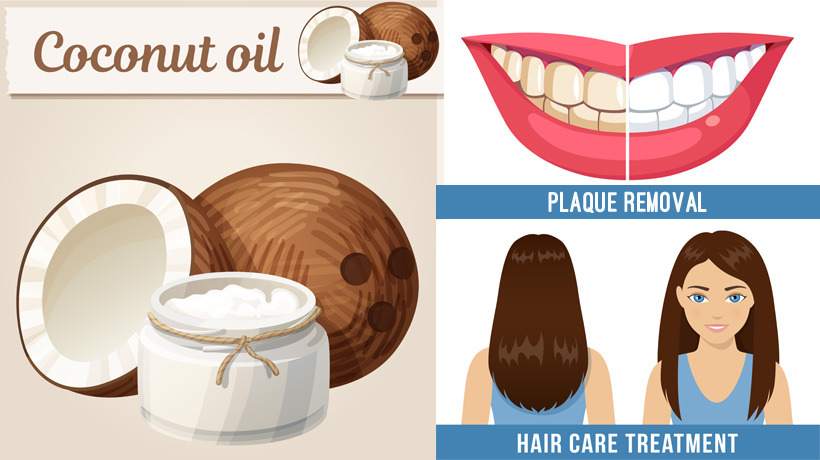You’ve heard many people discuss the benefits of coconut oils. According to Medical News Today, coconut oil has grown in popularity in recent years, amid claims that it can do everything from supporting weight loss to slowing the progression of Alzheimer’s disease. Manufacturers have replaced other oils with coconut oil in packaged products, and many households use it for cooking. It features not only in fried food, but in sweets, shampoos, coffee, and smoothies. What is it that makes coconut oil so appealing?
Sun protection
When applied to your skin, coconut oil may protect it from the sun’s ultraviolet rays, which raise your risk of skin cancer and cause wrinkling and brown spots, according to Healthline. In fact, one study done by the U.S. National Library of Medicine states that researchers have found that coconut oil blocks about 20% of the sun’s UV rays. However, keep in mind that it doesn’t provide the same protection as conventional sunscreen, which blocks about 90% of UV rays. Another study estimated that coconut oil has a sun protection factor (SPF) of 7, which is still lower than the minimum recommendation in some countries.
Increasing metabolism
According to Healthline, coconut oil contains medium-chain triglycerides. These are fatty acids that are quickly absorbed and can increase the number of calories you burn. Controlled studies have shown that MCTs can significantly boost your metabolic rate — at least temporarily. One study found that 15–30 grams of MCTs increased the number of calories burned by an average of 120 over a 24-hour period.
Dental care
Many research studies suggest that the use of oil pulling is effective against various dental issues such as plaque and halitosis, according to Organic Facts, a website reviewed by medical professionals. Recent research by Dr. F. C. Peedikayil suggests that oil pulling using coconut oil can be an effective procedure in reducing plaque formation and plaque-induced gingivitis.
Cooking safely at high temperatures
Coconut oil has a very high saturated fat content. In fact, about 87% of its fat is saturated, states the medically-reviewed website Healthline. This feature makes it one of the best fats for high-heat cooking, including frying. Saturated fats retain their structure when heated to high temperatures, unlike the polyunsaturated fatty acids found in vegetable oils. Oils such as corn and safflower are converted into toxic compounds when heated. These may have harmful effects on health. Therefore, coconut oil is a safer alternative for cooking at high temperatures.
Kidney and liver health
The presence of medium chain triglycerides and fatty acids in coconut oil may help in preventing kidney, liver and gallbladder diseases, states Organic Facts. Coconut oil is also believed to be useful in keeping the pancreas healthy by giving relief from pancreatitis. However, more scientific research is needed to establish these benefits.
Proper thyroid function
Unlike soy oil and other vegetable oils, coconut oil does not interfere with thyroid function, states Mercola, a website founded by Dr. Joseph Mercola. It has anti-inflammatory properties that can help reduce inflammation that may lead to hypothyroidism and hyperthyroidism.
Stress relief
According to Organic Facts, pure coconut carrier oil for aromatherapy is very soothing and helps remove stress. Applying it to the head, followed by a gentle massage, helps eliminate mental fatigue, according to research by Dr. Swee Keong Yeap.
Moisturizing skin
Coconut oil makes a wonderful moisturizer for your legs, arms, and elbows, states Healthline. You can use it on your face as well — though this isn’t recommended for those with very oily skin. It can also help repair cracked heels. Simply apply a thin coat to your heels at bedtime, put on socks, and continue on a nightly basis until your heels are smooth.
Shiny hair
Medical News Today discusses how it is beneficial for the hair because it penetrates better than mineral oils.
Heart health
Animal and human studies found that LDL and HDL cholesterol levels were greatly improved by taking coconut oil, states Mercola, because high cholesterol levels are a risk factor for heart disease. In particular, coconut oil’s saturated fats may actually increase “good” HDL cholesterol, while also helping convert “bad” LDL cholesterol into a less harmful form.
Sources:
https://www.healthline.com/nutrition/coconut-oil-uses#section1
https://www.ncbi.nlm.nih.gov/pmc/articles/PMC3140123/
https://www.ncbi.nlm.nih.gov/pubmed/22279374
https://www.organicfacts.net/health-benefits/oils/health-benefits-of-coconut-oil.html
https://www.ncbi.nlm.nih.gov/pubmed/25838632
https://www.ncbi.nlm.nih.gov/pmc/articles/PMC4247320/
https://articles.mercola.com/health-benefits-coconut-oil.aspx
https://www.medicalnewstoday.com/articles/282857.php



